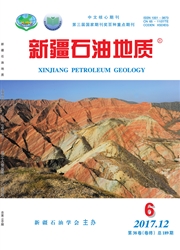

 中文摘要:
中文摘要:
对天然气一固态硫酸钙体系进行了初步恒温热模拟实验研究,探讨了反应途径和热力学特征。结果表明,高温下天然气与固态硫酸钙可以发生明显的硫酸盐热化学还原反应(TSR),产物主要为硫化氢、二氧化碳、碳酸钙、水和焦炭。随TSR程度加深,天然气中总烃所占比例呈递减趋势,天然气干燥程度与酸化程度均增大。给出了天然气参与TSR的反应途径通式并进行了热力学分析。热力学上长链烷烃比短链烷烃更容易与固态硫酸钙发生TSR.以川东北飞仙关组鲕滩高H2S天然气藏为例进行了TSR体系的地质实例研究,发现模拟实验结果与实际地质例证结论基本一致。
 英文摘要:
英文摘要:
Isothermal simulation experiments on natural gas-solid calcium sulfate system have been carried out under high temperature and high pressure, and possible reaction pathways and thermodynamic characteristics of thermochemical sulfate reduction (TSR) have been discussed. The results show that hydrogen sulfide, carbon dioxide, calcium carbonate, water and carbon are the main products in the TSR system. With increasing TSR, the total hydrocarbon amount in" natural gas decline, and the gas dryness and gas souring index increase. The general reaction expression for TSR involving natural gas and a thermodynamic analysis of TSR system are given. Long- chain hydrocarbons take priority of reaction with solid calcium sulfate over short-chain hydrocarbons. Feixianguan formation oolitic shoal high H2S natural gas pool in northeastern Sichuan basin is taken as an example for geologic case studies of TSR system. It is found that the results from simulation experiments basically coincide with the geologic case studies.
 同期刊论文项目
同期刊论文项目
 同项目期刊论文
同项目期刊论文
 期刊信息
期刊信息
